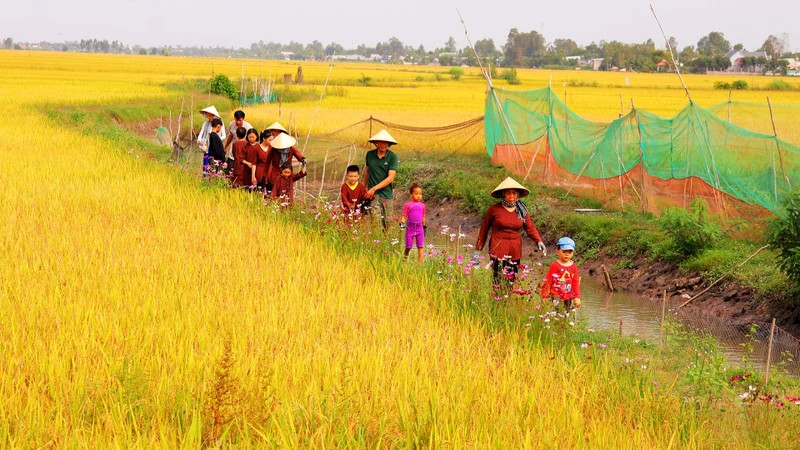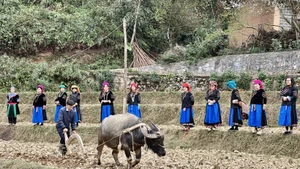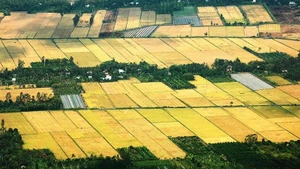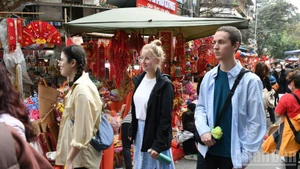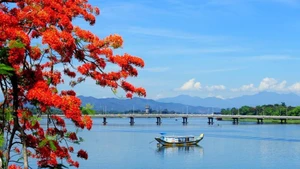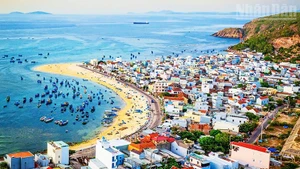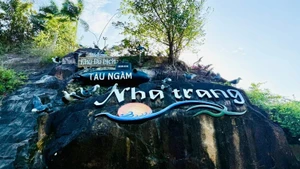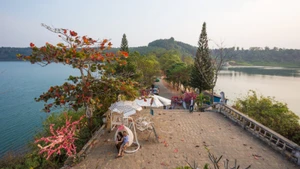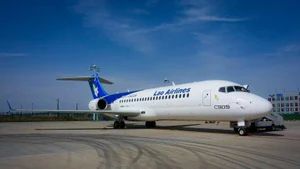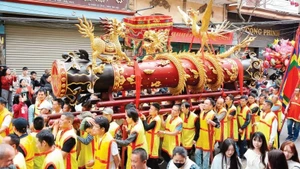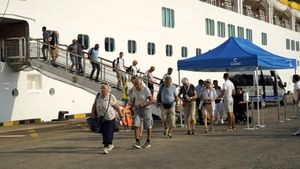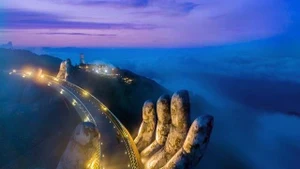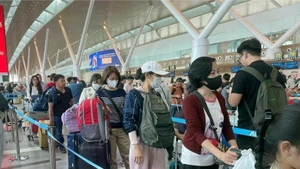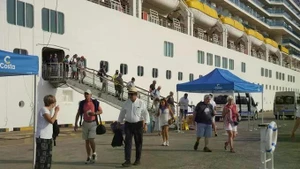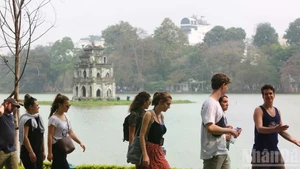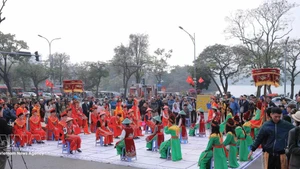Although achieving important results, Dong Thap must focus on synchronous solutions to continue developing agricultural tourism sustainably and effectively.
Attraction of agricultural tourism
This winter-spring rice crop, in the fields near Tram Chim National Park, Tam Nong district, has become bustling with harvesting rice with sickles, threshing rice by hand, catching fish by hand. These are not the daily activities of farmers here. Because over time, today, that image has almost “disappeared” in the flow of modern life, when farmers have gradually improved the way they harvest rice and catch fish.
To help tourists recall and experience the hard times of growing rice, this winter-spring rice crop, Ho Chi Minh City Wildtour Company cooperated with and supported Quyet Tien Ecological Agriculture Cooperative (Phu Thanh A commune, Tam Nong District) to organise a tour called “Experience a day as a farmer in the harvest season”.
This is a tourism activity in the fields (also known as recreational agriculture). This model creates experiences by bringing tourists back to nature, participating in agricultural activities, such as planting and harvesting, having fun and learning. In addition to experiencing rice harvesting, visitors can participate in rustic activities such as fishing, duck herding, or enjoying a country meal.
Recently, on a journey to find traditional values, connecting with nature through the tour “Experience a day as a farmer in the harvest season”, nearly 20 domestic and foreign visitors were very interested and said they were lucky to have the opportunity to experience being a farmer.
“When I experienced it, I saw how hard and tiring farming is. From here, I feel that I need to appreciate more the bowl of rice and the rice grains of my homeland”, Nguyen Mai Quynh Tram, a visitor from Hoc Mon District, Ho Chi Minh City shared.
Also on that journey, visitors heard farmers confide and share about the environmentally friendly ecological rice model, the close connection between ecological rice fields and the project to conserve and develop red-crowned cranes at Tram Chim National Park.
Bui Minh Nguyet, representative of Wildtour Company said: “I hope that through the tour, we will promote the typical ecological rice model of Tam Nong. At the same time, bring children the opportunity to learn about the traditional rice harvesting process. The tour aims to promote the ecological rice growing model of Tram Chim, Tam Nong. In addition, Wildtour Company wants to let tourists experience harvesting rice in the traditional way of our ancestors in the past”.
According to Nguyen Minh Tuan, Director of Quyet Tien Ecological Agricultural Cooperative, in the coming time, the cooperative plans to continue researching and developing new tourism products such as seeding season tours, mouse catching season tours, etc., to bring more diverse and attractive experiences to tourists.
Leaving Tram Chim, we headed to Sa Dec - the flower city of the Southwest region. This place is increasingly attracting tourists with its agricultural tourism. Currently, in Sa Dec City, there are 20 agricultural-community tourism attractions.
Coming to the Mien Tay Lodge tourist spot on Tran Thi Nhuong Street in Tan Phu Dong Commune, even though it is not a holiday or Tet, this place still attracts many tourists to visit, take photos with the flower garden, and experience planting trees.
Doan Huu Nhieu, owner of the Mien Tay Lodge tourist spot, said: “The ornamental flower growing profession in Sa Dec used to only grow and sell ornamental flowers, there were not many activities to bring added value to agricultural products. Therefore, I chose to develop tourism from exploiting the local agricultural culture”.
In recent times, the development of the agricultural tourism model has helped change the thinking of farmers, the face of Dong Thap countryside in general and Sa Dec in particular. “People have also had a different perspective on tourism because through the development of agricultural tourism, they can sell agricultural products at a high value.
Thanks to the revenue from developing tourism services, the economic value per unit of farmers’ production area has increased significantly,” said Vice Chairwoman of the People’s Committee of Sa Dec City, Vo Thi Binh.
 |
| Tourists experience cutting and threshing rice by hand right in the field. |
Many synchronous solutions are needed
Dong Thap has 72 agricultural-rural tourism destinations, including 15 typical operating points and some newly formed points but are the meeting points of many tourists, typically: The Mango Trail tourist and resort site, in Hamlet 4, My Xuong Commune, Cao Lanh District; Senta farm, in Hamlet K8, Phu Duc Commune, Tam Nong District; Sa Dec Ornamental Flower Tourist Area, in Khanh Nhon Hamlet, Tan Khanh Dong Commune, Sa Dec City, with the experience product entitled “A day as an artisan” - experiencing instructions, practicing planting, caring for, shaping bonsai, ornamental flowers; Duyen Nhut Flower Paradise, Khanh Hoa Hamlet, Tan Khanh Dong Commune; some Lai Vung pink grapefruit garden sightseeing spots.
To develop agricultural tourism, farmers have proactively renovated the landscape and invested in the infrastructure of tourist attractions. Models such as visiting fruit gardens, experiencing farming, and visiting traditional craft villages have attracted a large number of tourists.
In addition, tourist attractions have diversified tourism products, creating many unique and attractive tourism products, such as rowing a boat to see lotus fields, fishing, and enjoying countryside cuisine with many dishes made from lotus. However, besides the achieved results, the Dong Thap tourism industry is facing many challenges.
Agricultural tourism is developing rapidly but lacks connections, simple products, and is seasonal. The province also realised that to develop agricultural tourism in a sustainable direction, it is necessary to implement many synchronous solutions.
According to the People’s Committee of Sa Dec City, in the coming time, there needs to be continuous guidance and support from local authorities and travel agencies. At the same time, farmers must join hands in consciously changing their thinking, gradually becoming more professional and creative with new economic models with great potential such as agricultural tourism.
Implement the renovation, upgrading and expansion of key traffic routes connecting local tourist routes. Coordinate with sectors and provinces to transfer and apply science and technology in the cultivation and transplantation of new flowers and flower varieties to meet tourists’ tastes.
Talking about the orientation and solutions to focus on developing agricultural tourism in the coming time, Deputy Director of the Department of Culture, Sports and Tourism of Dong Thap Province, Le Thi Mai Trinh, said: The provincial tourism industry is strengthening the work of advising on the implementation of the Dong Thap tourism development project for the 2025-2030 period, focusing on agricultural tourism products; strengthening the connection between relevant departments, sectors, institutes, schools, and consulting experts to build agricultural tourism products according to the characteristics of each locality.
Learning practical experiences from localities with effective agricultural tourism models, researching, building and perfecting agricultural tourism products; linking with provinces and cities in the Mekong Delta region to promote and effectively exploit agricultural tourism products.
Recently, during a working session with the Party Committee of Dong Thap Provincial People’s Committee on tourism development in Dong Thap Province in the 2025-2030 period, Le Quoc Phong, member of the Party Central Committee and Secretary of Dong Thap Provincial Party Committee requested the provincial tourism sector to conduct a comprehensive review of the current development status.
It is necessary to strengthen coordination between the tourism sector and localities and related sectors to build unique and attractive tourism products, creating a distinct appeal for Dong Thap. Phong also directed the urgent development of a tourism development project for Dong Thap in 2025-2030, with a comprehensive, detailed and clear plan.
The project needs to identify specific targets, along with a roadmap and feasible solutions to achieve those targets. In particular, it is necessary to classify main tourist attractions, secondary tourist attractions and connecting routes, creating favourable conditions for exploitation and development.
